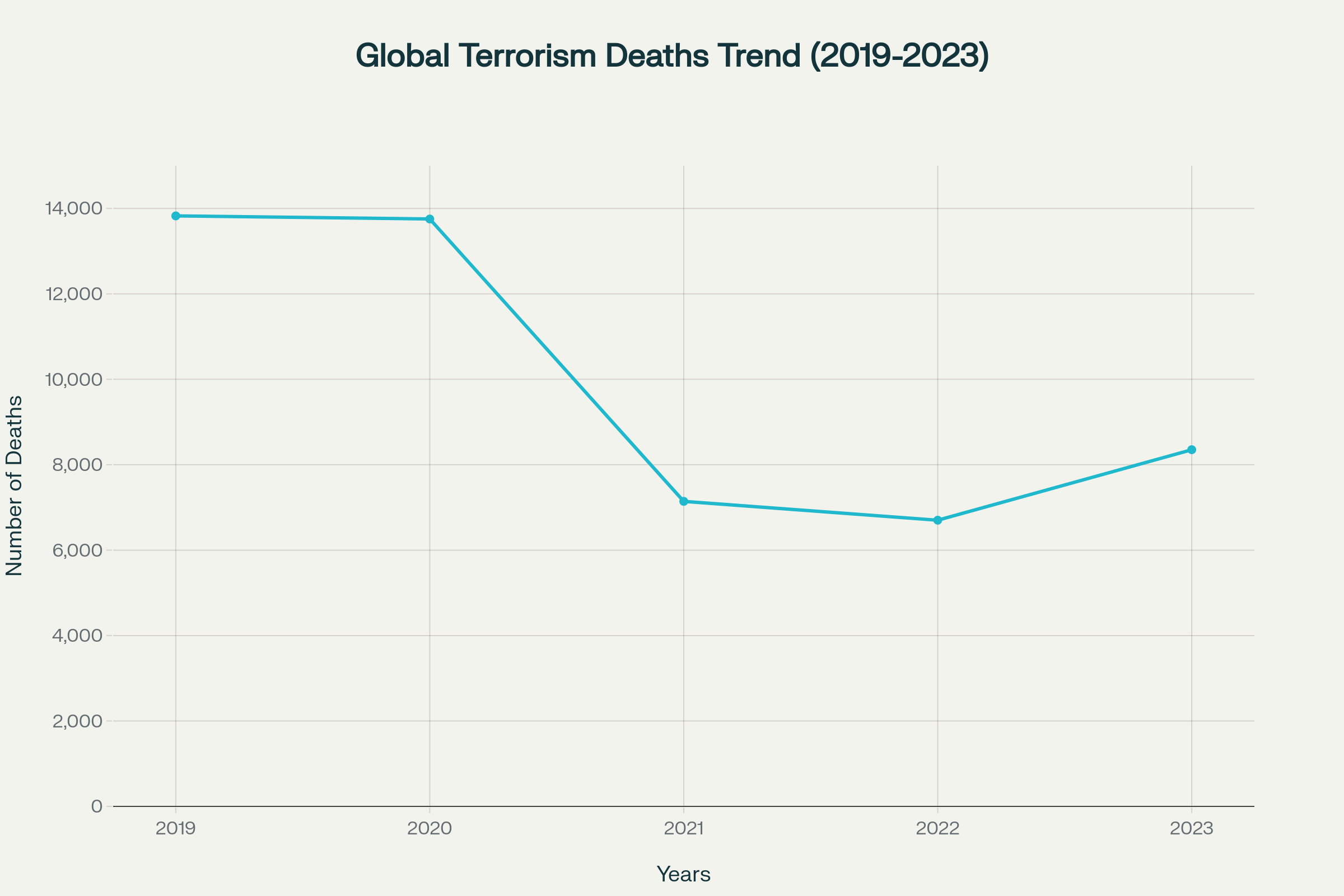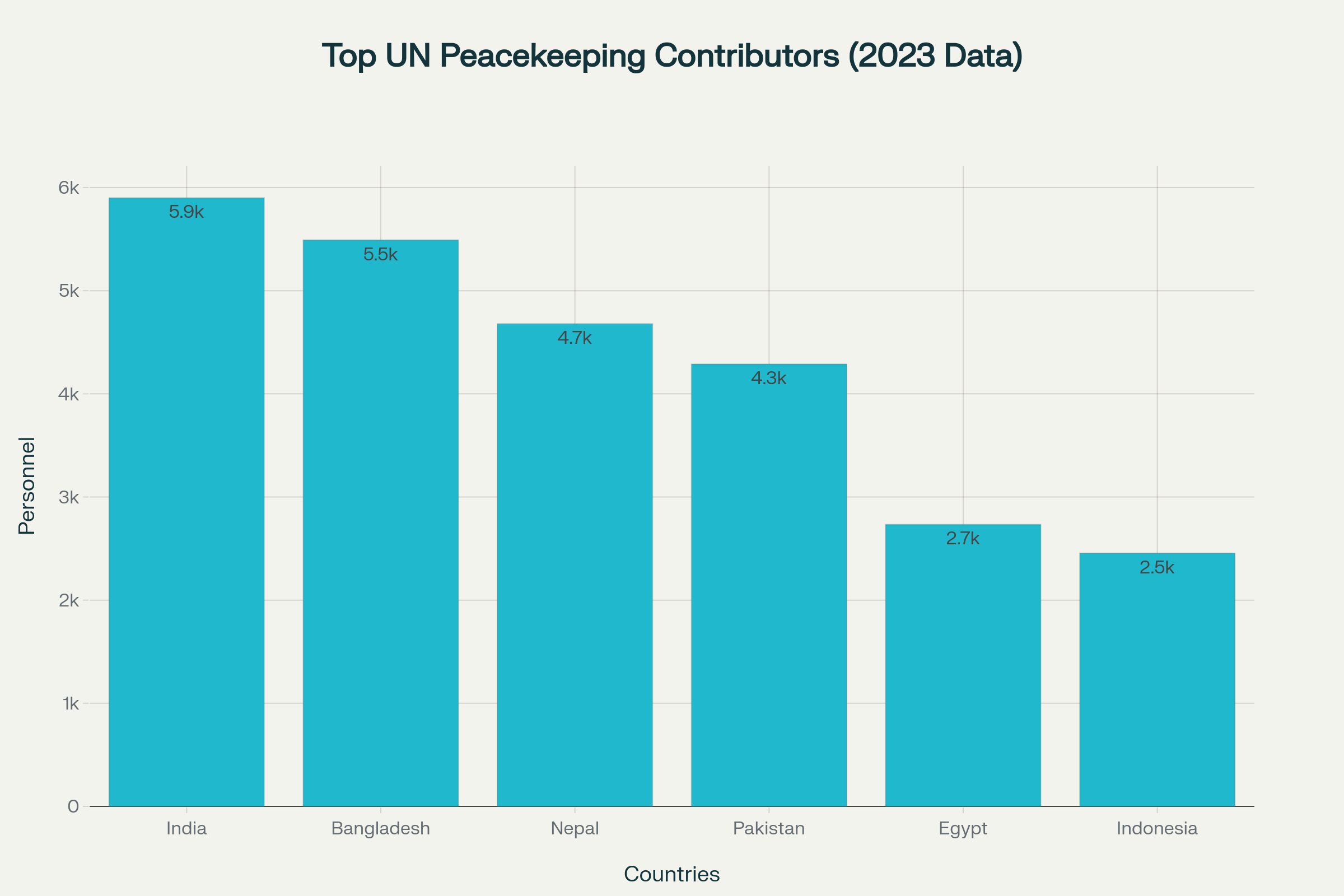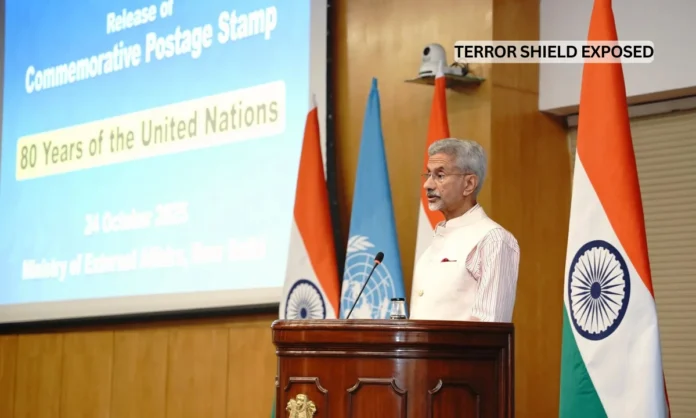Key Highlights:
- External Affairs Minister delivers scathing critique of Pakistan’s attempts to shield terror group TRF at UN Security Council following Pahalgam attack
- Jaishankar UN Pakistan terror response highlights institutional gridlock preventing effective counter-terrorism measures within global body
- UN debates have become “increasingly polarized” with working “visibly gridlocked” according to India’s diplomatic assessment of multilateral failures
Opening Overview
External Affairs Minister S Jaishankar delivered an unprecedented diplomatic offensive targeting the United Nations’ counter-terrorism effectiveness during the organization’s 80th anniversary celebrations, with his Jaishankar UN Pakistan terror response directly challenging Pakistan’s role in protecting terror groups. Speaking with remarkable directness, the Jaishankar UN Pakistan terror response questioned multilateralism’s credibility when sitting UN Security Council members openly shield organizations claiming responsibility for barbaric terror attacks such as the Pahalgam incident. His comprehensive Jaishankar UN Pakistan terror response comes as India intensifies pressure on international bodies to take decisive action against Pakistan-backed terrorism, highlighting systemic failures in global security architecture.
🚨EAM Dr S Jaishankar demolishing the United Nations's double standards.
— Rakesh Kishore 🇮🇳 (@RakeshKishore_l) October 24, 2025
'All is not well with the UN', says EAM Dr S Jaishankar as he points out how a 'sitting UNSC member shielded' a terror group.❗️ pic.twitter.com/hOcjejUU6r
The timing of this Jaishankar UN Pakistan terror response underscores growing frustration with the UN’s inability to address pressing security challenges, particularly when member states themselves obstruct effective counter-terrorism measures. His intervention at the UN anniversary event represents India’s strongest diplomatic challenge yet against institutional protection of terrorism within the global body’s highest decision-making forum. The Jaishankar UN Pakistan terror response reflects broader concerns about the UN’s capacity to maintain international peace and security in an increasingly complex threat environment.
Pakistan’s Terror Shield Operations
- Pakistan attempted to remove references to The Resistance Front (TRF) from UNSC press statements condemning the Pahalgam attack
- TRF, identified as a Lashkar-e-Taiba proxy, was officially documented in UN Security Council monitoring reports following the April 2025 massacre
- Multiple intelligence sources confirmed the attack “could not have happened without Lashkar-e-Taiba support” despite Pakistan’s diplomatic interference
Pakistan’s behavior as a non-permanent UN Security Council member has drawn sharp criticism following revelations about its systematic attempts to sanitize references to terror groups in official UN documentation, forming a crucial component of the Jaishankar UN Pakistan terror response. According to UN Security Council monitoring team reports, Pakistan actively sought to remove mentions of The Resistance Front (TRF) from official statements condemning the Pahalgam terror attack that killed 26 civilians in April 2025. This diplomatic maneuvering occurred despite TRF’s documented claims of responsibility for the massacre, including publication of photographs from the attack site, which the Jaishankar UN Pakistan terror response specifically highlighted.
The UN Security Council’s 36th monitoring report under the 1267 sanctions committee explicitly identified TRF’s role in the Pahalgam attack, marking the first time this Lashkar-e-Taiba proxy group appeared in formal UN documentation. The report noted that TRF initially claimed responsibility on April 22, repeated the claim on April 23, but retracted it on April 26 following international scrutiny, details that strengthen the Jaishankar UN Pakistan terror response arguments. Pakistan’s attempts to shield TRF from UN scrutiny have exposed what the Jaishankar UN Pakistan terror response described as fundamental contradictions in the global body’s counter-terrorism mandate.
India’s Foreign Secretary revealed that the country had provided inputs about TRF in half-yearly reports to the UN’s 1267 Sanctions Committee monitoring team in May and November 2024, bringing out its role as a cover for Pakistan-based terrorist groups. The Jaishankar UN Pakistan terror response emphasized how Pakistan’s pressure to remove references to TRF in the April 25 UN Security Council Press Statement demonstrates systematic diplomatic protection of terrorist organizations.
| Terror Group | UN Documentation | Pakistan’s Response | Attack Responsibility |
|---|---|---|---|
| The Resistance Front (TRF) | First mentioned in UNSC 1267 report July 2025 | Attempted removal from UNSC statements | Claimed Pahalgam attack (26 deaths) |
| Lashkar-e-Taiba | UN-proscribed since 2005 | Claims organization is “defunct” | Provided operational support to TRF |
| Jaish-e-Mohammad | UN-designated terrorist group | Diplomatic protection at UNSC | Operating through proxy groups |
UN System Institutional Crisis
- Security Council debates have become “increasingly polarized” with operations “visibly gridlocked” according to diplomatic assessments
- Reform processes are systematically obstructed using reform mechanisms themselves, creating institutional paralysis
- Global terrorism deaths increased 22% to 8,352 in 2023, highlighting urgent need for effective multilateral responsess3.amazonaws
The United Nations faces an unprecedented credibility crisis as its core functions become increasingly compromised by political gridlock and member state interference, central themes in the Jaishankar UN Pakistan terror response. His assessment that “all is not well” with the UN reflects deeper structural problems preventing the organization from addressing global priorities effectively, which the Jaishankar UN Pakistan terror response systematically documented. The external affairs minister highlighted how meaningful reforms are consistently obstructed through manipulation of the very reform processes designed to modernize the institution, a key aspect of the Jaishankar UN Pakistan terror response critique.
The Jaishankar UN Pakistan terror response warning about “visibly gridlocked” UN operations extends beyond terrorism to encompass broader challenges in maintaining international peace and security. The organization’s inability to forge consensus on critical issues has reduced its effectiveness to what the Jaishankar UN Pakistan terror response described as “lip service” rather than substantive action. This institutional paralysis becomes particularly problematic when dealing with urgent security threats requiring swift, coordinated international responses, as the Jaishankar UN Pakistan terror response emphasized.

Global terrorism deaths increased 22% to 8,352 in 2023, reversing a three-year declining trend
Global terrorism statistics reveal the urgency behind the Jaishankar UN Pakistan terror response concerns about UN effectiveness. Deaths from terrorism rose to 8,352 in 2023, representing a 22% increase from the previous year, while the number of terrorist attacks decreased to 3,350, indicating attacks are becoming more deadly. The Jaishankar UN Pakistan terror response highlighted how this deteriorating security environment demands more effective multilateral cooperation, not the diplomatic obstruction demonstrated by Pakistan’s UNSC behavior.
India’s Global Leadership Role
- India contributes 5,901 personnel to UN peacekeeping missions, the highest globally across 12 active operations
- Indian peacekeeping contributions exceed 290,000 troops deployed over 50+ missions since the 1950s
- 168 Indian peacekeepers have made supreme sacrifice while serving under UN flag, demonstrating commitment to multilateralism
India’s constructive approach to multilateral engagement stands in stark contrast to the obstructionist behavior criticized in the Jaishankar UN Pakistan terror response, with the country maintaining its position as the world’s largest contributor to UN peacekeeping operations. As of December 2023, India deployed 5,901 military personnel across 12 UN peacekeeping missions, significantly exceeding contributions from all five permanent Security Council members combined. This substantial commitment reinforces the credibility of the Jaishankar UN Pakistan terror response critique of countries that undermine rather than support UN objectives.
The Jaishankar UN Pakistan terror response gains additional weight from India’s historical dedication to international peace and security through concrete contributions rather than diplomatic obstruction. Since the 1950s, India has participated in more than 50 UN peacekeeping missions, contributing over 290,000 troops and significant police personnel, with 168 Indian peacekeepers making the ultimate sacrifice while serving under the UN flag. This record of service strengthens the moral authority behind the Jaishankar UN Pakistan terror response arguments about the need for genuine commitment to multilateral principles.

India leads global UN peacekeeping contributions with 5,901 personnel deployed across 12 missions as of December 2023
India’s pursuit of permanent UN Security Council membership reflects its growing influence as a voice for Global South concerns, themes that resonate throughout the Jaishankar UN Pakistan terror response. The government accords highest priority to securing permanent membership through bilateral and multilateral engagements, working alongside G-4 Group partners and the L.69 Group representing developing countries. The Jaishankar UN Pakistan terror response positioned India as a responsible reformist voice seeking transformation rather than replacement of existing multilateral frameworks.
Counter-Terrorism Challenges
- Ten countries account for 87% of total terrorism-related deaths globally, with concentration increasing in conflict zones
- Over 90% of terrorist attacks and 98% of terrorism deaths occurred in conflict zones during 2023
- UN counter-terrorism sanctions regimes face systematic obstruction from member states protecting designated groups
The global counter-terrorism landscape presents complex challenges that validate concerns raised in the Jaishankar UN Pakistan terror response about institutional effectiveness. The concentration of terrorist activity has intensified, with ten countries accounting for 87% of total terrorism-related deaths globally, while over 90% of terrorist attacks and 98% of terrorism deaths occurred in conflict zones. These statistics underscore the urgency behind the Jaishankar UN Pakistan terror response call for more effective multilateral cooperation in addressing terrorism financing and operational networks.
The Jaishankar UN Pakistan terror response highlighted specific examples of how diplomatic protection of terrorist groups undermines global security efforts. Pakistan’s attempts to shield TRF from UN sanctions demonstrate broader patterns of state-sponsored obstruction that enable terrorist financing and operational capabilities. The Jaishankar UN Pakistan terror response emphasized how such behavior makes “the world more cynical” about genuine commitments to counter-terrorism cooperation.
Intelligence assessments referenced in the Jaishankar UN Pakistan terror response reveal sophisticated networks connecting Pakistan-based terrorist groups with proxy organizations operating across borders. The investigation into the Pahalgam terror attack exposed communication nodes linking terrorists to Pakistan, with TRF claims being reposted by known Lashkar-e-Taiba social media handles. These connections validate the Jaishankar UN Pakistan terror response arguments about systematic state support for terrorist infrastructure.
Closing Assessment
The Jaishankar UN Pakistan terror response represents a pivotal moment in India’s diplomatic approach to global security governance, challenging fundamental assumptions about international cooperation when member states systematically undermine institutional objectives. His warning that equating victims and perpetrators of terrorism represents the height of global cynicism resonates beyond immediate bilateral tensions to address core questions about multilateral effectiveness. The comprehensive Jaishankar UN Pakistan terror response demonstrates India’s evolution from passive participant to assertive advocate for genuine reform in international institutions.
Despite acknowledging the UN’s flawed nature, the Jaishankar UN Pakistan terror response maintained that abandoning hope would be counterproductive, advocating instead for sustained support during this crisis period while demanding accountability from obstructionist members. This balanced diplomatic strategy suggests India seeks transformation rather than replacement of existing multilateral frameworks, positioning the country as a responsible reformist voice in global governance. The Jaishankar UN Pakistan terror response aligns with India’s broader aspirations for permanent UN Security Council membership while addressing immediate security concerns through alternative channels when necessary.


